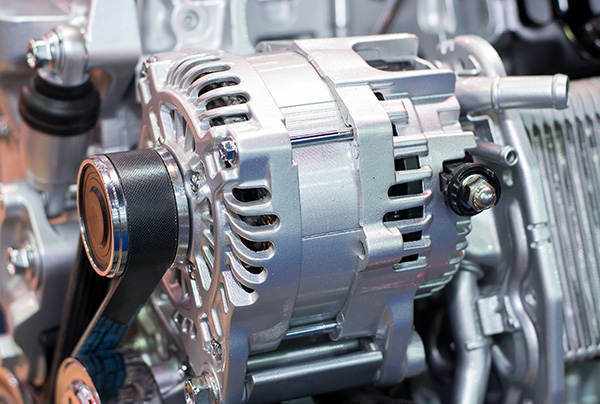
When your car’s battery dies, most people assume the battery itself is to blame. But in many cases, it’s the alternator that’s at fault. The alternator is responsible for keeping the battery charged and powering your vehicle’s electrical systems while the engine is running. If it begins to fail, your battery won’t stay charged, and you could find yourself stranded—often without warning.
Knowing the symptoms of a bad alternator and how to spot them early can help you avoid sudden breakdowns and keep your car’s electrical system operating smoothly.
What the Alternator Does in Your Vehicle
Your car’s alternator is a small generator driven by the engine’s serpentine belt. It creates electricity by converting mechanical energy into electrical energy. That power is used to recharge the battery and operate everything from the headlights and dashboard lights to power windows, radio, and climate control systems.
While the battery provides the energy to start the engine, the alternator takes over once the car is running. Without it, your battery would drain quickly, and your electrical systems would shut down. That’s why a failing alternator is such a serious issue—it can lead to more than just a dead battery.
Warning Signs Your Alternator May Be Going Bad
There are several common signs that your alternator is failing. Some are subtle, while others are hard to ignore.
Dim or Flickering Lights
One of the first signs of a weak alternator is headlights that appear dimmer than usual or flicker while driving. You may also notice the dashboard lights changing brightness or interior lights behaving oddly.
Dead Battery
A bad alternator won’t recharge your battery, so if the battery dies shortly after being replaced or charged, the alternator may be the real problem.
Electrical Glitches
If your power windows move slowly, the radio cuts out, or your dashboard displays start to malfunction, it could indicate insufficient voltage being supplied by the alternator.
Warning Light on the Dashboard
Most vehicles have a battery-shaped warning light that illuminates when the charging system is having trouble. This light may come on briefly during startup and then go off, but if it stays lit or comes on while driving, it’s a sign of trouble.
Engine Stalling or Trouble Starting
If the alternator isn’t supplying enough power to keep the engine running, you may notice stalling—especially when idling. In some cases, the engine may not start at all if the battery is already drained.
Unusual Noises
A failing alternator can produce whining or grinding noises due to worn-out bearings or a loose serpentine belt. These sounds usually come from the front of the engine bay and increase with engine speed.
Why Alternator Problems Can Be Confusing
Alternator issues are often mistaken for battery problems because the symptoms are similar. But replacing the battery alone won’t fix a bad alternator. In fact, you might go through multiple batteries if the alternator isn’t doing its job. That’s why it's important to test the entire charging system instead of guessing based on symptoms alone.
We use diagnostic equipment to check the battery’s charge level, the alternator’s output, and the health of the serpentine belt that powers the alternator. This gives a full picture of what’s happening and prevents unnecessary part replacements.
Other Factors That Affect Alternator Performance
Sometimes, the alternator itself isn’t bad, but another component is causing it to underperform. For example:
- A slipping or worn serpentine belt can prevent the alternator from spinning fast enough to generate the necessary power.
- Corroded battery terminals or poor electrical connections can interfere with voltage flow and mimic alternator failure.
- A faulty voltage regulator (often part of the alternator) can allow voltage to fluctuate, which may damage other electrical components or cause inconsistent charging.
These issues all require attention and can be addressed once the true source of the problem is identified.
How Long Do Alternators Last
Most alternators last between 80,000 and 150,000 miles, but this range can vary depending on driving conditions, the vehicle's electrical demand, and maintenance habits. Vehicles with numerous accessories, such as heated seats, upgraded audio systems or added electronics, place extra stress on the alternator.
Keeping the battery, belts, and connections in good condition can help extend the life of the alternator. Regular inspections are also key to catching small issues before they lead to failure.
Ripley’s Total Car Care – Charging System Diagnostics in Spring & Houston, TX
At Ripley’s Total Car Care, our technicians know how to spot the early signs of alternator failure and can test your battery and charging system quickly and accurately. If your car is showing signs of power loss or your dashboard light has you concerned, let us take a closer look.
Schedule your visit today at either our Spring or Houston location, and drive with confidence, knowing your vehicle’s electrical system is in top shape.